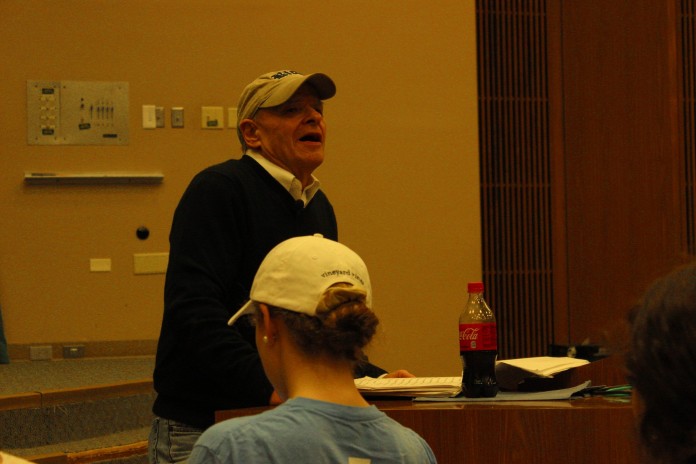Stories have the power to make people feel and to change how they see the world, award-winning author Tim O’Brien told students and faculty Friday afternoon.
Most famous for his acclaimed novel “The Things They Carried,” a semi-autobiographical collection of stories inspired by his experiences in the Vietnam War, O’Brien is the author of eight novels and numerous short stories and essays. In addition to writing, O’Brien teaches at Texas State University in San Marcos.
“Stories encourage, and they embolden us,” O’Brien told the hundreds of students and faculty who filled Bennett Auditorium to hear him speak. “Stories help us to see the world freshly, hear it freshly and, above all, to feel the world freshly, in a way we’ve never quite felt it before. Kind of, but not quite, stories can give us access to other people’s lives.”
O’Brien explained that stories are like important lies that reveal a deeper truth by engaging readers’ emotions, as well as their minds.
“A story is aimed not just at the intellect, although at the intellect, too,” O’Brien said. “A good story is also aimed at your blood and at your tear ducts and at the back of your neck and at your spine and at your kidneys. It is aimed at the whole human being, trying to get your body to respond, including your heart and your soul.”
O’Brien’s most famous story, “The Things They Carried,” has sold more than 2 million copies worldwide. It was a finalist for the Pulitzer Prize and has received the Chicago Tribune Heartland Prize and other awards.
“His books have always spoken to me really deeply, even though I never went to war,” said professor Dr. Luke Ferretter of the English department who coordinated the event. “I didn’t have to go through that experience. He’s just been one of those artists for me who expressed you better than you could express yourself.”
The book has also been included in the English curriculum for classes from middle school to college. Houston junior Casey Froehlich read “The Things They Carried” last year as part of the Baylor Interdisciplinary Core.
“I think what I liked most about the book was the balance of craft and brutal honesty.” Froehlich said. “There’s so many stories in there that are so alarming, like they’re all very difficult to read, but there’s something really beautiful about the way he’s able to be so honest about the brutality that he had to live through and that we still, even to this day, are perpetuating in other places.”
Although O’Brien spoke with tear-filled eyes about serious topics ranging from the death of his father to his experiences in Vietnam, he also interspersed his lecture with humor.
“He thinks very seriously about telling stories that have both humor and tragedy in them, because he believes that’s what life is like,” Ferretter said.
One way O’Brien engaged the audience with humor was by giving several tips for aspiring writers, such as not to use too much alliteration.
“Do not write this sentence,” O’Brien said. “‘The red rollicking river of her tongue rubbed me the wrong way.’ Instead, write: ‘She kissed me. I gagged.’”
In between these moments of humor, O’Brien addressed a number of somber issues relating to the reality of life, crafting fiction and “The Things They Carried,” such as the nature of truth, the evils of absolutism and what it’s like to confront what O’Brien termed “the ambiguities of what it means to kill and to die.”
“In the end, ‘The Things They Carried’ is meant to be a fairly simple book about what it feels emotionally like to be a soldier, bearing things like guilt, two heads on your shoulders, a sense of great responsibility, a sense of pride,” O’Brien said.
O’Brien’s experiences as a soldier in the Vietnam War not only shaped “The Things They Carried” but also played an important role in his lecture, O’Brien’s primary focus was on how stories affect people and help us make sense of the world.
“My books are not aimed at war issues,” O’Brien said. “They’re aimed at the heart.”






